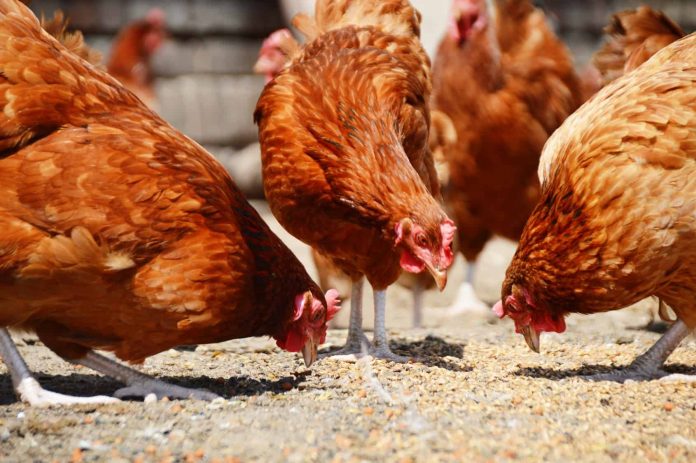There is no magic to feeding chickens. Small- flock producers can choose from many brands of feed from several manufacturers. These manufactured feeds are computer formulated by company nutritionists to provide optimal nutrition for each particular type and age of chicken. The formulation of these feeds is similar to commercial feeds and is based on years of research on commercial chickens. Manufactured feeds are considered a complete diet, providing all of the nutrients required by chickens. In most cases, small-flock producers will not need to add supplemental nutrients if they exclusively use these feeds.
Feeds are formulated and manufactured to meet chickens’ nutritional needs at specific ages and production characteristics. For example, starter feeds are fed to chicks from hatch to about 6 weeks of age. Grower and developer feeds are fed to “adolescent” or growing chickens from about 7 weeks to just before laying, around 17 weeks. Layer or breeder feeds are fed to chickens that are producing eggs, generally beginning around 18 to 20 weeks of age and lasting for several years.
These different types of feeds have similar ingredients, including common grains such as corn, barley, or wheat for carbohydrates; soybean or canola meal for protein; and other ingredients such as limestone, oil or fat, and a premix of vitamins and minerals. Based on the formulation, the proportions of these ingredients vary to provide the proper level of nutrition for particular birds. Each sack of feed is labelled with its specific use.
It is important to feed egg-producing chickens the appropriate feed from hatch through their productive years to maximize their egg production. Improper feeding at any stage can result in poor egg production throughout their productive lives.
Whether your birds are bantams or large fowl, white or brown egg layers, all chickens have similar
requirements for protein, carbohydrates, fats, fibre, vitamins, and minerals. Your birds rely on you to provide proper feed. If you do, they will produce many high-quality eggs for your family, friends, and neighbours. Following a few simple feeding rules results in a healthy and productive flock of chickens.
Starter feeds
Feed newly hatched chicks a starter diet until they are about 6 weeks old. Starter diets are formulated to give proper nutrition to fast-growing baby chickens. These feeds usually contain 18 to 20 per cent protein.
It is not recommended to give meat-bird starter feed to young layer-type chickens. Diets formulated for young meat-type chickens are more expensive and generally higher in protein (22 per cent) to maximize growth, which is neither necessary nor desirable for egg-laying chickens.
 Learn More
Learn MoreREAD ALSO: Poultry House, Equipment, & Facilities
Grower and developer feeds
Once the birds reach about 6 weeks of age, begin using a grower or developer feed. Grower feeds are lower in protein, about 15 or 16 per cent, and are formulated to sustain good growth to maturity.
If developer feeds are available, you can substitute them for the grower feed after about 14 weeks of age. Developer feeds are lower in protein than grower feeds (14 to 15 per cent) and are formulated to pre- pare young chickens for egg production; sometimes they contain higher calcium to aid the eggshell formation of the first eggs of young layers. (Note: Grower and developer feeds are virtually interchangeable; either one can be fed to chickens between 6 weeks of age and the beginning of egg production.)
Layer feeds
Start feeding layer feeds at about 18 to 20 weeks of age or when the first egg is laid, whichever occurs first. Layer feeds are formulated for chickens that are laying eggs. Layer feeds contain about 16 per cent protein and extra calcium (3 to 4 per cent) so chickens will lay eggs with strong shells and not deplete the calcium in their bodies. Sometimes “breeder feeds” are available. These feeds are formulated for chickens that are producing eggs for hatching. Breeder feeds are basically layer feeds that contain slightly more protein and are fortified with extra vitamins for proper chick development and hatching.
Table scraps and greens
Chickens, like other family pets, enjoy many of the same foods their owners do. However, feeding your chickens an excessive amount of table scraps and greens is not beneficial to the birds or their productivity. Some supplementation is fine—in fact, greens help to keep egg yolks a deep orange colour— but, as with scratch, these foods should be limited. The same rule for scratch applies to table scraps and greens: the total supplementation should be no more than the chickens can clean up in about 20 minutes.
Pasture
There has been a great deal of interest in recent years in “pasturing” chickens to allow them daily access to green grass. While pasturing can be a beneficial supplement to a feed ration, it is not a substitute for the various feeds noted above. Chickens with daily access to pasture consume significant amounts of insects and seeds when available. They also consume small amounts of grass but do not have the ability to properly digest it.
When considering pasture for chickens, the greatest feed value is during the spring and summer when the insect activity and seed production is highest. During the late fall and winter, there is little feed value in the pasture for chickens.
Organic feeds
In recent years, organic poultry feeds have become more readily available. These feeds are formulated to meet the same nutritional requirements as traditional feeds; however, the ingredients are from organic sources and do not include certain additives. Organic grains are typically produced without the aid of commercial fertilizers or pesticides. In addition, the seed stock for organic grain comes from sources that are not genetically modified (GM). As commercially available sources of non-GM feedstuffs become more limited, alternative grains are used in formulating diets.
Contributed by James Hermes
VIDEO: What to feed your chickens so they lay eggs year-round















